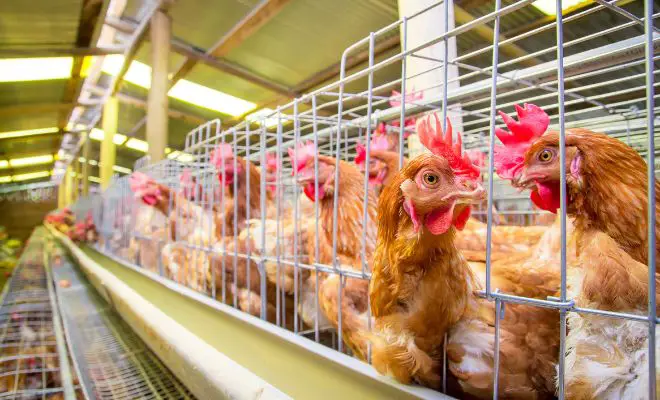Can Chickens Eat Raspberries? 7 Amazing Health Benefits!

Raspberries are a type of fruit with taste and nutrients, so offering it to chickens won’t be any bad, I guess. But things aren’t as straightforward as we always think.
So, can chickens eat Raspberries? Yes, they can, but the ideal quantity should be maintained. Chickens can eat raspberries in moderation as part of a balanced diet. The nutrients it comes with are all great for the chicken’s optimal health and egg production. Just don’t overfeed it to your chickens.
In this article, I’ll go over the nutritional benefits, any potential downsides, and which parts of the berry and plant are safe. You don’t have to be tense about serving ideas as well. Just stick to the article and get to know everything.
Table of Contents
Can Chickens Eat Raspberries? Are Raspberries Safe for Chickens?
Chickens absolutely can and should eat raspberries as an occasional treat. Raspberries provide lots of key vitamins, minerals, and antioxidants that are great for chicken health and productivity.
Just be careful not to overdo it with any fruit, including raspberries. Too much sugar and acidic content can cause loose droppings or diarrhea. But when fed as the occasional treat, chickens can safely enjoy small amounts of raspberries.
Can Baby Chickens Eat Raspberries?
Technically no. I recommend not giving any treats, including raspberries, to baby chicks until they are at least 15 days old.
Chicks younger than this cannot properly digest sugars and acids found in fruit. Trying raspberries too young would likely cause diarrhea and digestive upset.
What If I Feed Chickens Raspberries Every Day?
It’s best to limit how many raspberries chickens eat. These berries should only make up 5-10% of their diet. Too much can cause digestive issues.
The high sugar and acidity make it difficult for chickens to process lots of fruit each day. Consuming too many raspberries regularly can lead to
- Diarrhea
- Appetite/weight loss
- Weakness, etc.
The key is moderation. This allows chickens to enjoy the berries without disrupting their digestion or overall well-being. More than that, you can start to throw things out of balance.
Can Chickens Eat Different Raspberries Parts?
Chickens can eat all parts of a raspberry plant without issue. However, some parts offer more nutritional benefits than others. Here’s a breakdown:
Can Chickens Eat Raspberries Skin?
Yes. The skin, or pericarp, of raspberries is entirely edible and safe for chickens. The skin contains digestion-aiding fiber and small amounts of vitamins and minerals.
Can Chickens Eat Raspberries Seeds?
Raspberry seeds are safe and healthy for chickens to eat. The seeds provide protein, omega-3 fatty acids, fiber, magnesium, and phosphorous – all key nutrients chickens need.
The seeds also contain antimicrobial properties that support healthy gut flora in chickens. So feel free to let your flock eat up both the flesh and seeds of raspberries.
Can Chickens Eat Raspberries Leaves and Stems?
Yes, raspberry leaves are nutritious for chickens to eat. The leaves and stems are both basically edible. Both of the parts contain Vitamins A, B, and C, iron, magnesium, calcium, selenium, and antioxidants.
Many chicken keepers dry and crush raspberry leaves and stems to sprinkle them as a supplement over feed.
In moderation, chickens can safely snack on fresh raspberry leaves and stems right off the bush. Just don’t let them gorge themselves to diarrhea-inducing levels.
Do Chickens Eat All Forms of Raspberries?
You may be wondering if chickens can eat raspberries in all forms. Well, not all the forms of raspberries are good for chickens.
Here’s a rundown of a few popular raspberry items and their edibility check for chickens.
Can Chickens Eat Raw Raspberries?
Of course! Raw, fresh raspberries are the best way to feed this tasty fruit. Whole ripe berries offer the most nutrition and natural sugars that are safe for digestion. Make sure to rinse them well first.
Can Chickens Eat Canned Raspberries?
It’s fine to offer chickens drained canned raspberries on occasion. Just avoid heavy syrups with added sugars. And make sure canned berries are only an occasional treat, not every day.
Can Chickens Eat Raspberry Jam?
We don’t recommend feeding chickens jam or jelly products. Even 100% fruit spread has very concentrated sugar that’s hard for chickens to process. Small amounts licked up as a rare treat are likely fine, but don’t purposefully serve raspberry jam.
Nutritional Profile of Raspberries for Chickens
Let’s check how nutritious Raspberries are. According to USDA, 100g of raw raspberries offer the following nutrients:
| Nutrients | Amount | Unit |
|---|---|---|
| Water | 85.8 | g |
| Energy | 52 | kcal |
| Energy | 220 | kJ |
| Protein | 1.2 | g |
| Lipid (fat) | 0.65 | g |
| Ash | 0.46 | g |
| Carbohydrate | 11.9 | g |
| Fiber | 6.5 | g |
| Sugars | 4.42 | g |
| Sucrose | 0.2 | g |
| Glucose | 1.86 | g |
| Fructose | 2.35 | g |
| Calcium | 25 | mg |
| Iron | 0.69 | mg |
| Magnesium | 22 | mg |
| Phosphorus | 29 | mg |
| Potassium | 151 | mg |
| Sodium | 1 | mg |
| Zinc | 0.42 | mg |
| Copper, Cu | 0.09 | mg |
| Manganese | 0.67 | mg |
| Selenium | 0.2 | μg |
| Vitamin C | 26.2 | mg |
7 Benefits of Raspberries That Will Blow Your Mind
In moderation, Offering chickens raspberries has many advantages for their health and productivity. Here’s the scoop on the top benefits:
- Egg Production: The antioxidants in raspberries support the reproductive system. A couple of berries a few times a week can boost ovulation and might lead to more eggs from your flock.
- Egg Yolk Color: Raspberries have carotenoids that give the yolks a richer orange color. It’s minor but does make for mighty fine-looking eggs.
- Eggshell Strength: In berries, there’s a mineral called manganese that plays an important role in producing robust eggshells so your eggs stay intact.
- Immune Health: Vitamins A, C, and E amp up chickens’ immunity and ability to fight off sickness. Less disease means happier birds.
- Feather Growth: The silica found in seeds promotes fuller, shiner feathers so your hens look their best.
- Digestive Aid: Fiber prevents issues like compacted crops and supports digestion to prevent common chicken GI problems.
- Heat Relief: On hot days, the high water content in raspberries helps cooling effects so birds stay comfortable in summer weather.
4 Risks Associated With Feeding Raspberries to Chickens
Raspberries make a great supplemental treat. But whatever the food is, or how nutritious it is, overfeeding them can cause some problems. Let’s take a look at all these below.
1. Digestive Upset
The natural sugars and fiber in too many raspberries can irritate chickens’ digestive tracts, leading to loose droppings or diarrhea. It’s best to feed just a few berries 2-3 times per week. Their systems can’t handle large amounts.
2. Nutritional Imbalances
Replacing too much of a balanced chicken feed with sugary fruit offsets the ideal nutritional ratios chickens need. Some treats are fine, but their main diet should still be quality feed.
3. Appetite/Weight Fluctuations
When chickens fill up on too many sweet raspberries, it often suppresses their appetite for balanced feed. Dramatic weight loss or gain can occur if treats displace nutrition.
4. Increased Pests
Wet, loose manure that results from overfeeding attracts pests like flies, larvae, beetles, and rats. These pests carry and spread dangerous diseases to backyard flocks.
How to Serve Raspberries to Chickens: 6 Personalized Tips!
Ready to offer your flock some antioxidant-rich raspberry treats? Here is our checklist for feeding raspberries to chickens.
How Much And How Often to Offer Raspberries
Start by offering just 1-2 raspberries per chicken. Limit raspberry treats to just 2-3 times per week maximum to prevent overfeeding sugar levels.
Their digestive systems need time to rest and process berry nutrients without getting overloaded.
6 Feeding Tips
- Always wash thoroughly before feeding
- Mash soft for young chicks
- Mix into feed to prevent resource guarding
- Provide an extra water source
- Refrigerate/freeze excess berries
- Remove old berries to prevent pests/illness.
Follow these tips, and raspberries make a fun, healthy, occasional treat your flock will love!
Related Readings:
FAQs
Let’s take a look at our quick Q&A section to sharpen your knowledge a little more.
Q: Can too many raspberries kill chickens?
Too many can cause severe intestinal distress, which may eventually be fatal if untreated. Practice moderation to keep your flock safe.
Q: What about moldy or rotten raspberries for chickens?
Always discard any moldy, damaged, or rotting produce to prevent illness. Only feed your flock clean, fresh raspberries in prime condition.
Q: Should I refrigerate or freeze leftover raspberries?
Yes, properly storing extra berries allows you to stretch out raspberry treats over time. Just avoid keeping them too long before use.
In Summary
Raspberries are a nutritious supplemental treat backyard chicken owners can offer their flocks. If you want your chickens and chicks to be active and happy, raspberries are waiting to meet you!
It is full of key vitamins, minerals, and antioxidants. Raspberries support chicken health, immunity, feathers, bones, eggs, and productivity when fed properly and in moderation. Just be careful not to overfeed high sugar levels. Adding a few raspberries several times a week helps round out balanced nutrition for happy, healthy chickens!






